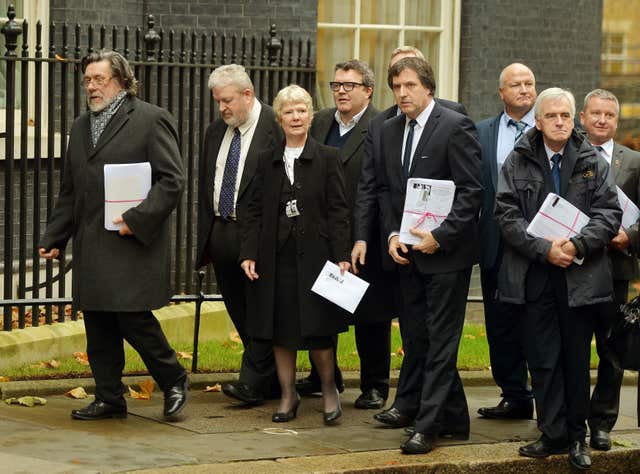‘Prejudicial’ TV programme renders Shrewsbury 24 convictions unsafe, court told
Lawyers claim ‘higher echelons of the state’ were involved in making a ‘deeply prejudicial’ documentary broadcast during the first of three trials.

The “higher echelons of the state” were involved in the making of a “deeply prejudicial” programme broadcast during the first of the trials of the Shrewsbury 24, the Court of Appeal has heard.
Two dozen trade unionists who picketed in Shrewsbury during the 1972 national builders’ strike were charged with offences including unlawful assembly, conspiracy to intimidate and affray and faced three “highly politicised trials”.
Lawyers representing 14 members of the so-called “Shrewsbury 24”, including Royle Family star Ricky Tomlinson, argue that their convictions are unsafe because of the 1973 broadcast of documentary Red Under The Bed during the first trial.
A live panel discussion which followed the programme featured a Conservative MP describing the strike as an example of “blatant communist influence”, a statement the 14’s lawyers argue “would have been deeply prejudicial, provoking panic in the mind of this Shrewsbury jury”.
They also argue that the destruction of original witness statements by the police, which the defence were not told about at trial, means the convictions are unsafe.
At a hearing in London on Wednesday, senior judges were told that a “covert Foreign Office agency” known as the Information Research Department (IRD) provided “considerable assistance” in making Red Under The Bed.
Danny Friedman QC, representing 12 of the pickets, said in written submissions that the head of the IRD had told a senior Foreign Office official that “we had a discreet but considerable hand in the programme”.
He added that the IRD “had consulted the Security Service” – also known as MI5 – about the programme, which was also praised by then prime minister Edward Heath, who said: “We want as much as possible of this.”
Mr Friedman told the court: “It is obvious … a covert executive agency played a part in deliberately propagandising against the core subject matter of the proceedings.”
He added: “It is clear now that the higher echelons of the state bore responsibility for deliberate covert involvement in the production of the programme.
“In all the circumstances, the approach taken to broadcasting this programme has rendered the convictions unsafe.”
Mr Friedman also argued that the destruction of original witness statements meant the pickets were “manifestly prejudiced by not being able to seek to investigate these matters before the jury”.
He told the court that the prosecution were aware that original statements had been destroyed two weeks before the beginning of the first of the three trials.
In a note of a meeting between investigating officers and the prosecution, the police said the original statements had been taken “before officers knew what they were trying to prove”, Mr Friedman said.
He added that no arrests were made on the day of the pickets, but that police took action after “a period of concerted lobbying by the National Federation of Building Trades Employers”, which compiled an “intimidation dossier” that was sent to the then home secretary, Robert Carr.
Mr Friedman concluded that “there has undoubtedly been material non-disclosure of the fact that statements were destroyed” which he argued rendered the convictions unsafe.
John Price QC, representing the CPS, said the appellants’ “fresh evidence” on the making of Red Under The Bed was “wholly irrelevant”.
He also said in the CPS’s written response to the appeals that the new evidence “does not and is not alleged to show any link at all between the scheduling of the broadcast and the trial”.

Mr Price added that the judge in the first trial “had already directed the jury in strong terms that political considerations of any kind were irrelevant”.
He also argued that there was “no destruction of evidence, only of form”, saying that, while the destruction of original statement “was deliberate, it was not done for an improper purpose”.
He concluded that there was, therefore, no “material non-disclosure” which could render the convictions unsafe.
Terry Renshaw, one of the pickets who was given a four-month suspended sentence for unlawful assembly, said before the hearing that he was “very optimistic that we will win”.
Speaking outside the Royal Courts of Justice, Mr Renshaw, 72, said it was “unreal” to finally have the chance to clear his name, saying: “I will no longer be called a criminal … it’s the lifting of the word ‘criminal’ that hangs over you.”
He added that, if the pickets win, it will be “a win for the whole trade union movement because, without the trade union movement, we would not be here now”.
The hearing – before Lord Justice Fulford, Mr Justice Andrew Baker and Mr Justice Goose – is due to conclude on Thursday and it is expected that the court will reserve its judgment.





